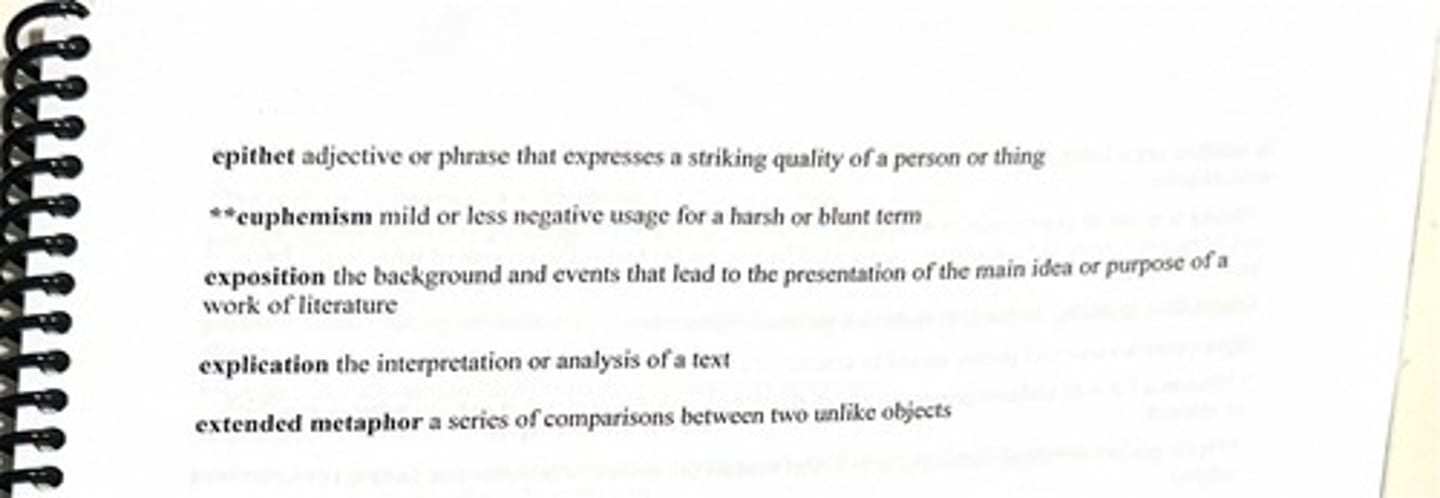AP English Literary and Rhetorical Terms: Key Concepts and Devices
1/46
There's no tags or description
Looks like no tags are added yet.
Name | Mastery | Learn | Test | Matching | Spaced |
|---|
No study sessions yet.
47 Terms
adage
a saying or proverb containing a truth based on experience and often couched in metaphorical language
allegory
a story in which the narrative or characters carry an underlying symbolic, metaphorical, or possibly an ethical meaning
alliteration
the repetition of one or more initial consonants in a group of words or lines of poetry or prose
allusion
a reference to a person, place, or event meant to create an effect or enhance the meaning of an idea
anachronism
a person, scene, event, or other element in literature that fails to correspond with the time or era in which the work is set
analogy
a comparison that points out similarities between two dissimilar things
antagonist
a character or force in a work of literature that produces tension or conflict
antithesis
rhetorical opposition or contrast of ideas by means of a grammatical arrangement of words, clauses, or sentences
aphorism
short, pithy statement of a generally accepted truth or sentiment
apostrophe
a rhetorical device in which a speaker addresses a person or personified thing not present
archetype
an abstract or ideal conception of a type; an original model or form
assonance
repetition of two or more vowel sounds in a group of words or lines in poetry and prose
ballad
a simple narrative verse that tells a story that is sung or recited
bathos
use of insincere or overdone sentimentality
bildungsroman
a German word referring to a novel structured as a series of events that take place as the hero travels in quest of a goal
blank verse
poetry written in iambic pentameter, the primary meter used in English poetry and the works of Shakespeare and Milton
bombast
inflated, pretentious language used for trivial subjects
burlesque
a work of literature meant to ridicule a subject; a grotesque imitation
cacophony
grating, inharmonious sounds
caesura
a pause somewhere in the middle of a verse, often (but not always) marked by punctuation
caricature
a grotesque likeness of striking qualities in persons and things
carpe diem
literally, 'seize the day'; enjoy life while you can, a common theme in literature
catharsis
a cleansing of the spirit brought about by the pity and terror of a dramatic tragedy
climax
the high point, or turning point, of a story or play
coming-of-age story
a tale in which a young protagonist experiences an introduction to adulthood
conceit
a witty or ingenious thought; a diverting or highly fanciful idea, often stated in figurative language
connotation
the suggested or implied meaning of a word or phrase
consonance
repetition of two or more consonant sounds in a group of words or a line of poetry
couplet
a pair of rhyming lines in a poem
denotation
the dictionary definition of a word
denouement
the resolution that occurs at the end of a play or work of fiction
deus ex machina
in literature, the use of an artificial device or gimmick to solve a problem
diction
the choice of words in oral and written discourse
dramatic irony
a circumstance in which the audience or reader knows more about a situation than a character
elegy
a poem or prose selection that laments or meditates on the passing or death of something or someone of value
ellipsis
three periods ( . . .) indicating the omission of words in a thought or quotation
empathy
a feeling of association or identification with an object or person
end-stopped
a term that describes a line of poetry that ends with a natural pause often indicated by a mark of punctuation
enjambment
in poetry, the use of successive lines with no punctuation or pause between them
epic
an extended narrative poem that tells of the adventures and exploits of a hero that is generally larger than life and is often considered a legendary figure
epigram
a concise but ingenious, witty, and thoughtful statement
euphony
pleasing, harmonious sounds
epithet
adjective or phrase that expresses a striking quality of a person or thing

euphemism
mild or less negative usage for a harsh or blunt term
exposition
the background and events that lead to the presentation of the main idea or purpose of a work of literature
explication
the interpretation or analysis of a text
extended metaphor
a series of comparisons between two unlike objects